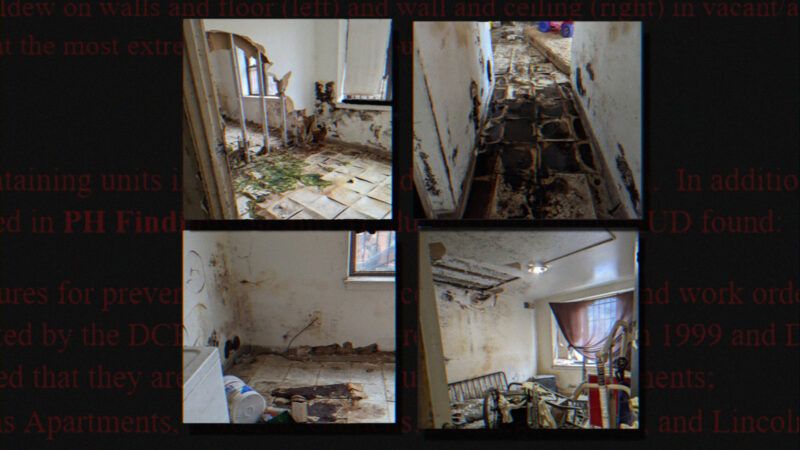New Report Reveals Uninhabitable Units, Shocking Incompetence at D.C. Public Housing Authority
D.C officials are calling for sweeping reforms to D.C. Housing Authority's governance, or even a federal takeover, in the wake of a damning new report.

The worst landlord in Washington, D.C., might be the district itself.
That's according to a damning new federal audit of the District of Columbia Housing Authority (DCHA) that criticized the authority for failing to provide "decent, safe, and sanitary housing opportunities for residents" at the 8,084 public housing units it operates.
The report from the U.S. Housing and Urban Development (HUD) found that DCHA had let many of the units become damaged by persistent water leaks and mold, had failed to adequately monitor lead risks to child residents, and failed to control crime at authority properties.
Photos included in the report show images of units made totally uninhabitable by black mold, crumbling walls, and missing floor tiles.
Roughly one-fifth of the authority's housing units are currently vacant. Some of these have been rendered uninhabitable by a lack of maintenance. Others are ready to be leased out, but the authority has failed to match them with an applicant.
In total, the report lists 82 deficiencies that HCDA will have to make serious remedial progress on within three months or risk more serious federal intervention.
"The DC Housing Authority is completely dysfunctional; it is failing its residents, and it is failing this city. It needs a complete leadership overhaul," said D.C. Councilmember Elissa Silverman in response to the report on Friday.
She promised to introduce legislation, which WTOP reports will include greater City Council oversight of authority funds and reconfiguring the authority's board to include members with housing finance and property management expertise.
One DCHA board member recommended to The Washington Post, which first reported on the investigation, that the authority be taken over by HUD or at least placed in receivership by the department. The long-troubled public housing authority was last placed in receivership in the 1990s.
The HUD report spotlighted serious governance issues it says have contributed to the dismal housing quality uncovered in its investigation.
DCHA's 13-member board of commissioners is internally divided and lacked transparency, according to the investigation. While commissioners were aware of serious problems faced by DCHA, they "could not speak to specific actions it was taking at DCHA to make improvements in these areas," reads the report.
The investigation also notes that DCHA Executive Director Brenda Donald is receiving a salary that exceeds HUD's salary cap, despite having "no experience in property development, property management or managing federal housing programs."
Donald, a former D.C. vice mayor, was initially appointed on a temporary basis in June last year while a nationwide search for a new director could take place. She was brought on as a permanent director in August 2021. The HUD report recommends Donald undergo training in managing HUD programs and public housing.
Public housing authorities across the country struggle with deteriorating unit quality and high operating expenses. The New York City Housing Authority periodically tops the Worst Landlord Watchlist put out by the city's Public Advocate. The Navajo Housing Authority—which manages 8,500 units of housing across the Navajo Nation in Arizona, New Mexico, and Utah—so badly managed new housing projects that it had to return $26 million to the federal government in 2017.
But D.C. appears to be in a league of its own. The HUD report paints a picture of an organization that can't even perform basic administrative functions.
The authority hasn't updated its waitlist for public housing units in over a decade and can't say how many people are even on the list. Inspectors discovered occupied units were listed as vacant, while vacant units were listed as occupied. DCHA has also failed to properly keep track of reasonable rental rates for the housing voucher program it oversees, raising the risk that it's being overcharged by participating landlords.
This poor performance is costing the housing authority money too. Its per-occupied unit expenses are 33 percent higher than that of public housing authorities in Atlanta, Baltimore, and Philadelphia.
In response to rising rents across the country, left-wing members of Congress have proposed repealing the Faircloth Amendment—which generally bans public housing authorities from adding new housing to their portfolios—and going on a massive public housing construction campaign.
The Democratic-controlled House passed a bill sponsored by Rep. Alexandria Ocasio-Cortez (D–N.Y.) repealing the Faircloth Amendment in 2020, but it died in the Senate.
The issues highlighted in the HUD investigation of DCHA suggest the authority can't even manage the units it has, let alone take on greater responsibility.
Rent Free is a weekly newsletter from Christian Britschgi on urbanism and the fight for less regulation, more housing, more property rights, and more freedom in America's cities.


Show Comments (64)